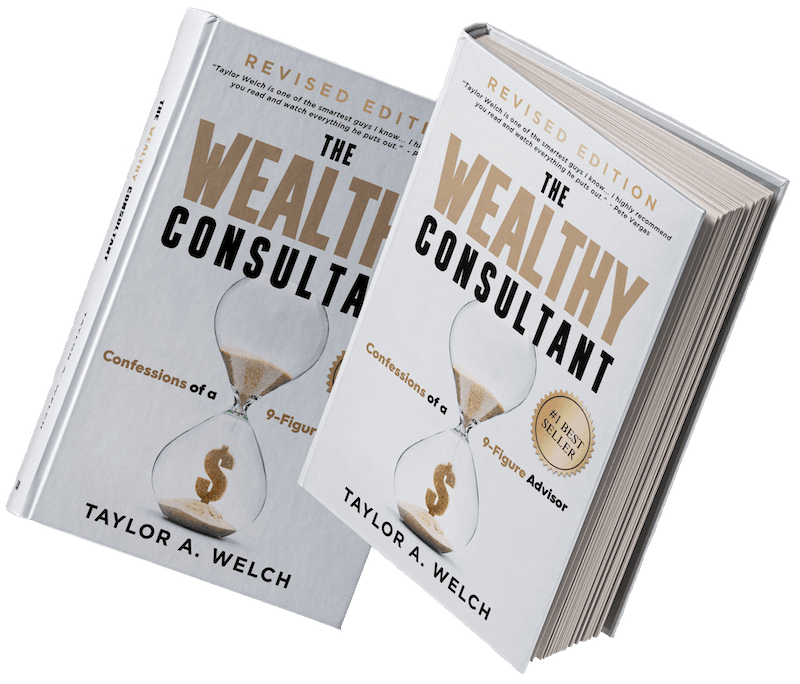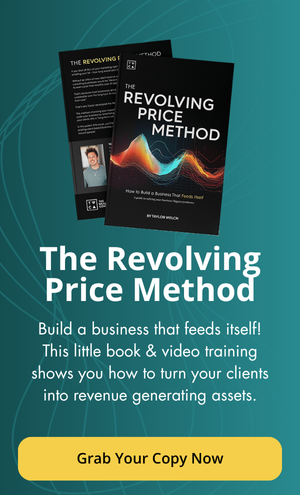Both/And Mentality, and Culture Building
Ask any successful founder what they’re building and the answer is likely to include words like “legacy,” “freedom,” or “wealth.” All great things. Not denying it.
But the real question, which doesn’t get asked nearly enough, is:
What kind of culture is this legacy being built on?
Because whether we’re talking about a team of A-players or a house full of toddlers, the culture determines whether the thing lasts.
Most of us didn’t get into entrepreneurship just to build income. Hopefully, if you’ve been around our Wealthy Consultant culture for a while, you know that we don’t ever build anything simply for money.
If you’re anything like our team, you got into all of this because you wanted options. More time. More leverage. The ability to be present at the dance recitals, baseball games, and all of the slow, sacred moments in between.
Wealth is awesome, yes. But, if your definition of “wealth” stops at your bank account, you’re building toward failure.
We define wealth around a multitude of “freedoms.” Structural. Emotional. Familial. And none of it works if the culture at home is crumbling while the business scales.
We’ve said it before and we’ll say it again: Wealth is not just money. It’s margin. It’s mastery. It’s meaning. And the ultimate test of our ability to build something great isn’t how fast we grow—it’s whether or not we can do it without losing our family in the process.
We’re building both. In harmony. (More on that here.) And we want to show you how to do the same.
Let’s dig into The Culture Code, and how raising a team and raising a child share more in common than you might think.
All Cultures Begin With Belief
We often hear business owners describing their culture in terms of behaviors. This makes sense, as it’s the foremost outward expression of culture.
However, cultures aren’t built on behavior.
Behavior is downstream from belief. Whether in our companies or our households, the “what” and “how” of people’s actions will always follow the “why.” When belief systems are clear (what we stand for, what we won’t tolerate, what we expect) behavior becomes a natural extension.
In both business and parenting, this means we can’t shortcut to rules without rooting them in reasons. “Because I said so” might produce compliance today… but is the root of rebellion tomorrow. Leaders and parents alike must build belief first. The foundation of your house matters more than the paint job.
Managing for Control Vs. Leading for Ownership
While we’re on this topic, let’s quickly clear up a bit of confusion around two words (and we promise, this is not a “small,” semantics thing… it has bigger implications).
Management and leadership are not the same thing.
When you manage a team’s efforts, you are essentially engaging in the necessary behavioral modifications to produce specific results.
- Stop doing this. Start doing that.
- Don’t do XYZ this way. Try it like this instead.
- Focus your efforts here.
But if we want to get the absolute BEST output from a team, our goal shouldn’t be to get them to behave. It should be to help them THINK better.
Leadership challenges the thought patterns behind every behavior, rather than taking them at face value and weighing their utility.
Now, pull that over into the realm of family culture and parenting.
Children, like team members, often need to have their thinking challenged before their behaviors will truly follow. The more they understand the reason behind the rule, the more likely they are to self-govern when no one’s watching.
A household (and company) full of independent thinkers aligned to the same mission. That’s our goal.
Competency Counts, but NEVER More than Character
In hiring for Wealthy Consultant, we use a 3-pronged rubric for hiring.
- Attitudal Fit – Do they align with the mission, vision, and values of the brand?
- Competency – Do they know how to do the specific things that will be required of them to be successful?
- Experience – Have they ever done what will be expected of them in this role before, AND have they done it at the LEVEL they will be expected to do it at now?
Here’s the hack. We prioritize attitude over either of the other two. Skill can be taught. Heart cannot. Being a mindful, hard-working, courteous, ethical, and naturally curious team member is far more valuable than direct experience or core competency.
This is equally true in parenting. What we reward (and what we model) gets replicated. If we obsess over performance, we raise anxious achievers. But if we emphasize character, grit, and curiosity, we raise resilient leaders.
You can easily over-emphasize the “strategy” bit of culture building. But, at the end of the day, the atmosphere and energy of a team matters immensely more than their abilities. (We explore this further here.)
Alignment Creates Protection
We’ve seen it in business too many times: high-potential talent placed in misaligned roles. The result? Burnout, disengagement, and unnecessary drama.
The same principle applies at home. Forcing a child into a role that doesn’t fit their personality is a fast track to resentment. Our job is not to mold our kids into a vision of success—but to observe, ask, listen, and align their unique wiring with the opportunities around them. The best leaders are also the best students of people.
Great Leaders Check In
Management by walking around might be a business tactic, but it’s also a parenting philosophy. Regular, intentional check-ins—How are you feeling? What’s not working? What’s inspiring you right now?—are the glue that holds relational culture together.
We’re not babysitters or taskmasters. We’re stewards of potential. And culture isn’t what we say—it’s how we show up, consistently, in the small moments that compound over time. (See also: how to balance work and family life without dropping either.)
The Family Is the First Company We Ever Lead
Before we ever wrote a business plan, we were writing culture into the lives of those closest to us. The principles that scale companies also shape character. If we can build teams that perform and homes that thrive, we become more than consultants. We start becoming architects of generational “wealth.”
Let’s build businesses that work and families that win.
Because we believe in a version of success that doesn’t make us choose.

Learn How to Build Businesses that Don’t Compromise Every Other Area of Your Life
The absolute best way to lead your family while building a business, is to build a business on strong, stable foundations that don’t make you the bottleneck to your own growth. If you want 15 profit-proven frameworks that have built some of the most profitable businesses of all time (including our own) you need to pick up our consulting manual, “The Wealthy Consultant.”

